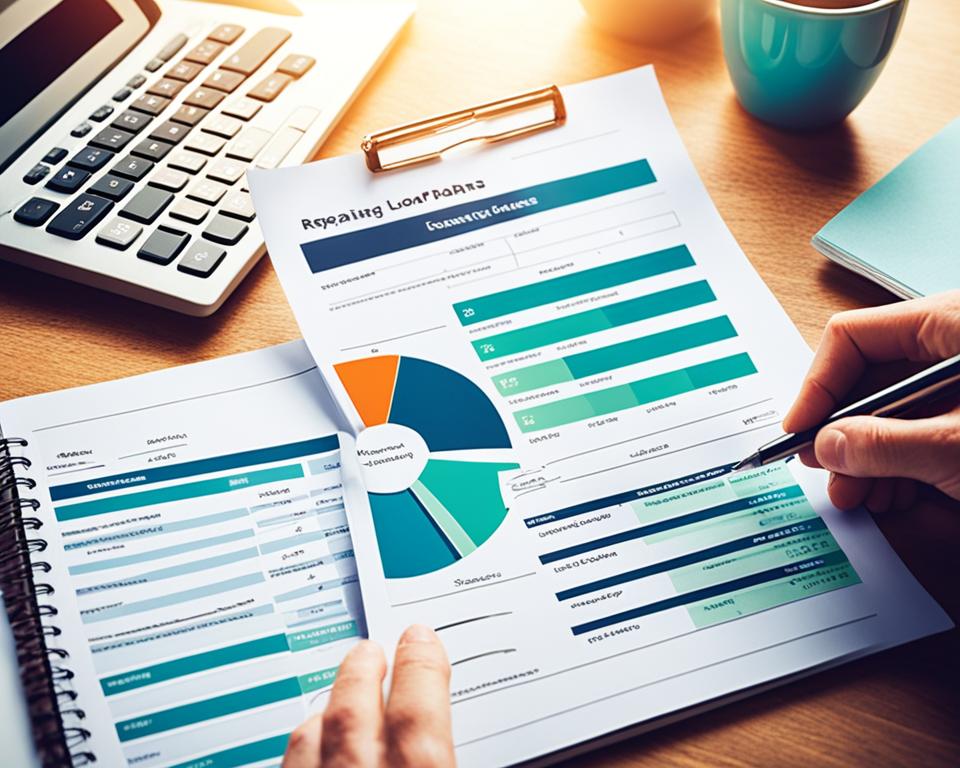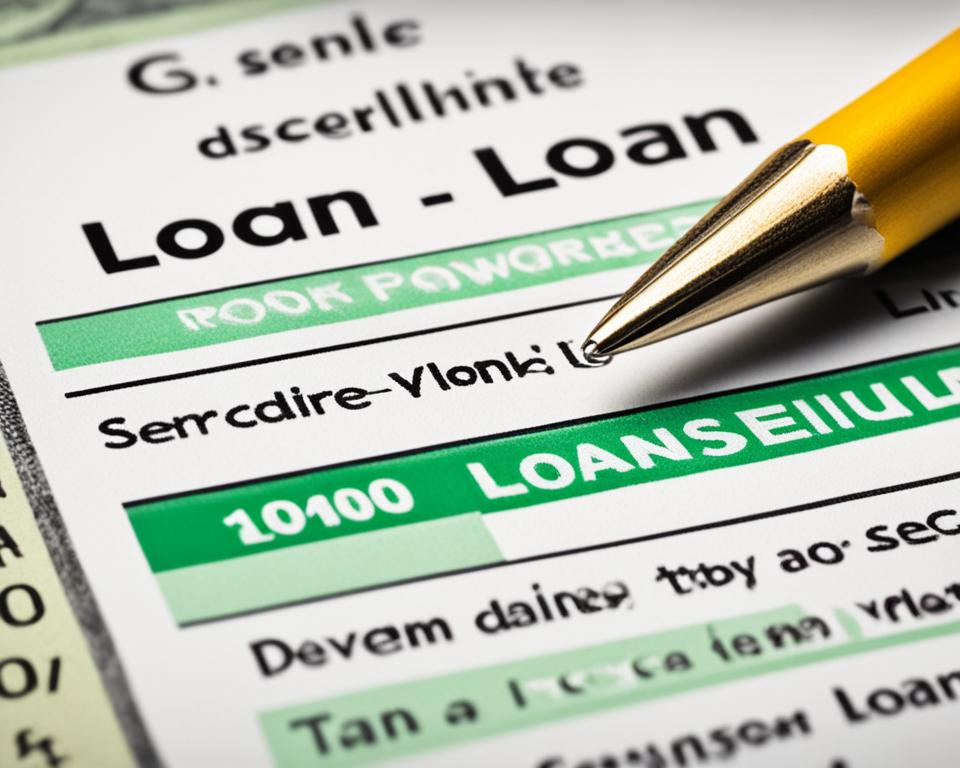Are you looking for strategies to efficiently repay your loans? Managing loan repayment can be overwhelming, but with the right approach, you can make significant progress towards becoming debt-free. In this article, I will discuss some effective loan repayment strategies that can help you save money and pay off your loans faster.
If you’re determined to pay off your loans quickly, making extra payments toward the principal is a powerful strategy. By paying more than the minimum each month, you can reduce the amount of interest you owe and shorten the repayment timeline. Refinancing is another option worth considering, especially if you have good credit and a steady job. It allows you to replace your current loans with a new loan at a lower interest rate, resulting in potential savings over time.
Enrolling in autopay and making biweekly payments can also accelerate your loan repayment. Autopay offers a quarter-point interest rate discount and can be applied to both federal student loans and private loans. Biweekly payments enable you to make an extra payment each year, saving you time and money in the long run.
Paying off capitalized interest and sticking to the standard repayment plan are also effective strategies. By making monthly interest payments while still in school or before your grace period ends, you can prevent the interest from capitalizing and increasing your overall balance. Additionally, sticking to the standard repayment plan for federal loans can be the quickest way to become debt-free.
Using “found” money and having a budget are two more strategies that can contribute to faster loan repayment. Whether it’s a raise, a bonus, or a financial windfall, allocating a portion of any extra money to your loans can help reduce your debt. Starting a side hustle or using money-saving apps can also generate additional income that can be put towards your loan payments.
Remember, everyone’s financial situation is unique, and it’s important to choose strategies that align with your goals and priorities. By evaluating your options and implementing the right strategies, you can effectively repay your loans and achieve financial freedom.
Key Takeaways:
- Making extra payments toward the principal can reduce interest and shorten repayment.
- Refinancing with a lower interest rate can result in significant long-term savings.
- Enrolling in autopay and making biweekly payments can accelerate loan repayment.
- Paying off capitalized interest and sticking to the standard repayment plan are effective strategies.
- Using “found” money and having a budget can contribute to faster loan repayment.
Make extra payments toward the principal
Making extra payments toward the principal of your loan is a powerful strategy for paying off loans faster. By doing so, you can reduce the total amount of interest you owe and shorten the repayment timeline.
When you make extra payments toward the principal, you are directly reducing the outstanding balance of your loan. This means that future interest charges will be calculated on a lower principal balance, resulting in savings over the long run.
Here’s an example to illustrate the impact of making extra payments toward the principal:
| Loan Details | Without Extra Payments | With Extra Payments |
|---|---|---|
| Loan Amount | $50,000 | $50,000 |
| Interest Rate | 6% | 6% |
| Loan Term | 10 years | 10 years |
| Monthly Payment | $555 | $555 |
| Total Interest Paid | $33,000 | $18,000 |
| Total Repayment | $83,000 | $68,000 |
In this example, by making extra payments toward the principal, you could save $15,000 on interest charges and pay off your loan two years earlier.
It’s important to ensure that your extra payments are applied to the principal balance and not used to advance the due date of your next payment. To do this, you can instruct your loan servicer to apply overpayments to the principal balance.
Applying overpayments to the principal balance is a crucial step in maximizing the benefits of making extra payments. By reducing the principal balance, you reduce the amount of interest that accrues on your loan, accelerating the repayment process.
Making extra payments toward the principal is an effective strategy that can help you pay off your student loans early and save money on interest. Consider incorporating this strategy into your financial plan to achieve your goal of becoming debt-free sooner.
Refinance if you have good credit and a steady job
If you have good credit and a steady job, refinancing your loans can be a smart strategy to consider. Refinancing involves replacing your current loans with a new loan that ideally offers a lower interest rate. By doing so, you can save money on interest over the life of the loan and potentially pay off your debt faster.
When refinancing, it’s crucial to choose a new loan term that is shorter than the remaining term on your current loans. Opting for a shorter loan term allows you to accelerate the repayment process, as you’ll be paying off the loan in a shorter amount of time.
Although refinancing can increase your monthly payment, the savings from a lower interest rate and shorter loan term can outweigh the initial increase. It’s important to consider the long-term benefits of refinancing, as it can help you become debt-free sooner and save money in the process.
Why Refinance?
Refinancing offers several advantages for borrowers with good credit and a stable income:
- Lower interest rate: Refinancing allows you to secure a loan with a lower interest rate, which means you’ll pay less in interest charges over time.
- Shorter loan term: Choosing a shorter loan term when refinancing can help you pay off your debt faster and save money on interest.
- Consolidate multiple loans: If you have multiple loans, refinancing allows you to combine them into a single loan with one monthly payment, simplifying your financial obligations.
Overall, refinancing offers an opportunity to improve your financial situation by reducing your monthly payment, saving on interest, and potentially paying off your loans sooner.
Is Refinancing Right for You?
While refinancing can be beneficial, it’s important to carefully evaluate your circumstances before making a decision. Consider the following factors:
“Refinancing allowed me to save thousands of dollars on my student loans. I was able to secure a much lower interest rate and pay off my debt in a shorter time frame. It was definitely the right choice for me.”
– Jane Miller, Refinancing Success Story
Financial goals: Determine your financial goals and how refinancing fits into them. Are you looking to save money in the long term, pay off your loans faster, or simplify your repayment process?
Current interest rates: Research current interest rates to compare them with your existing loan rates. If there has been a significant decrease in interest rates since you took out your loans, refinancing may be a viable option.
Creditworthiness: Lenders typically require a good credit score to qualify for favorable refinancing terms. If your credit score has improved since you initially obtained your loans, you may be eligible for better rates and terms.
Loan eligibility: Review your eligibility for refinancing by checking the requirements of various lenders. Consider factors such as income stability, debt-to-income ratio, and employment history.
Loan forgiveness or benefits: If you have federal loans and are eligible for loan forgiveness or other benefits, refinancing may not be the best choice, as it could forfeit these benefits. Make sure to evaluate the potential loss of any loan-specific advantages.
Before proceeding with refinancing, it’s essential to compare different lenders and loan offers to ensure you secure the best terms for your financial situation.
Enroll in autopay
Enrolling in autopay is a smart strategy to save money and expedite your loan repayment. Many federal student loan servicers offer a quarter-point interest rate discount when you sign up for automatic payments from your bank account. Some private lenders also provide this discount. While the savings may seem small, they can add up over time and contribute to paying off your loans faster.
When you opt for autopay, the loan servicer deducts your monthly payment directly from your bank account on a specified date. This eliminates the risk of missing payments and incurring late fees. It also ensures that your payments are made on time, improving your credit history.
By enrolling in autopay, you can also simplify your finances by consolidating multiple loan payments into one automatic payment. This can make it easier to manage your budget and avoid accidental missed payments.
Quarter-Point Interest Rate Discount
The quarter-point interest rate discount offered by federal student loan servicers and some private lenders can help you save money on your loans. Let’s say you have a loan with an interest rate of 5%. When you enroll in autopay, you can potentially reduce the interest rate to 4.75%. While it may not seem like a significant difference, it can lead to meaningful savings over the life of your loan.
| Loan Amount | Loan Term | Interest Rate | Monthly Payment | Total Interest Paid |
|---|---|---|---|---|
| $30,000 | 10 years | 5% | $318 | $17,193 |
| $30,000 | 10 years | 4.75% | $316 | $16,991 |
In the example above, a quarter-point interest rate discount on a $30,000 loan over a 10-year term can save you $202 in interest payments. While the discount may vary depending on the loan and lender, it’s essential to take advantage of this opportunity to reduce the overall cost of borrowing.
Enrolling in autopay is simple and can often be done through your loan servicer’s online portal. It’s important to familiarize yourself with the terms and conditions of autopay and ensure that you have sufficient funds in your bank account to cover the automatic payments.
“Enrolling in autopay can save you money and simplify your loan repayments. Take advantage of the quarter-point interest rate discount offered by federal student loan servicers and private lenders.”
By enrolling in autopay and taking advantage of the quarter-point interest rate discount, you can make steady progress toward paying off your student loans faster while potentially saving thousands of dollars in interest over the life of your loans.
Make biweekly payments
Making biweekly payments is a smart strategy to accelerate your loan repayment and save both time and money. Instead of making one full monthly payment, you pay half of your student loan bill every two weeks. This may seem like a small change, but it can have a significant impact on your overall repayment journey.
By making biweekly payments, you actually end up making an extra payment each year. Since there are 52 weeks in a year, you’ll make 26 half payments, which is equivalent to 13 full monthly payments. This extra payment goes directly towards your loan’s principal, reducing the total balance and shortening the repayment timeline.
Making biweekly payments not only helps you save on interest but also allows you to finish paying off your loans faster. It’s a simple strategy that can have a big impact on your financial future.
| Payment Frequency | Total Payments per Year | Repayment Time | Interest Saved |
|---|---|---|---|
| Monthly | 12 | Standard repayment period | No additional interest saved |
| Biweekly | 26 | Shortened repayment period | Significant interest savings over time |
Making biweekly payments is not only a financially savvy move, but it also helps you stay disciplined and organized. You can set up automatic payments every two weeks, aligning them with your paycheck schedule. This consistency ensures that you never miss a payment and stay on track towards becoming debt-free.
To see the potential impact of biweekly payments on your specific loan, you can use a biweekly student loan payment calculator. This tool will provide an estimate of how much time and money you can save by adopting this payment strategy.

By making biweekly payments, you can take control of your student loans and accelerate your journey to becoming debt-free. With each extra payment, you’re one step closer to financial freedom.
Pay off capitalized interest
When it comes to repaying student loans, understanding the concept of capitalized interest is crucial. Unless you have subsidized loans, interest accrues on your loans while you’re in school, during your grace period, and even during periods of deferment and forbearance. This accrued interest capitalizes when repayment begins, adding to your total balance.
To avoid the impact of capitalized interest on your loan repayment, there are a couple of strategies you can consider. One option is to make monthly interest payments while you’re still in school. By doing so, you prevent that interest from compounding and adding to your loan balance. Another approach is to make a lump-sum interest payment before your grace period ends. This way, you can reduce the amount of capitalized interest that adds to your principal balance.
Although paying off capitalized interest may not directly speed up the overall repayment process, it can definitely make a considerable difference in the long run. By addressing the interest that has accumulated and preventing it from capitalizing, you can potentially end up with a smaller balance to pay off, allowing you to become debt-free more efficiently.
It’s essential to plan your loan repayment strategy carefully and consider all available options, including paying off capitalized interest, in order to achieve your financial goals. Every step you take towards reducing your loan balance brings you closer to financial freedom.
| Pros | Cons |
|---|---|
| Reduces the overall loan balance | Does not directly speed up loan repayment |
| Prevents capitalized interest from adding to the principal | Requires additional financial resources for monthly interest payments |
| Can potentially save money on interest in the long run | May not be feasible for everyone |
By taking proactive steps to pay off capitalized interest, you can effectively manage your loan balance and expedite your journey to becoming debt-free. Remember, every effort you make towards reducing your overall loan balance brings you closer to achieving financial stability and freedom.
Stick to the standard repayment plan
The standard repayment plan, offered by the government for federal student loans, is a 10-year timeline designed to help you repay your loans efficiently. If you’re unable to make extra payments towards your loans, sticking to the standard plan is the quickest way to become debt-free.
While income-driven repayment plans and loan consolidation can extend the repayment timeline, it’s important to choose the option that aligns with your goals. These alternatives may provide temporary relief based on your income, but they can delay your road to being debt-free.
By adhering to the standard repayment plan, you can maintain a consistent payment schedule and ensure that you’re on track to pay off your loans in a timely manner. This approach allows you to have a clear, achievable goal and sets you on a quicker road to being debt-free.
Benefits of sticking to the standard repayment plan:
- Quicker loan repayment: By following the standard repayment plan, you can complete your loan payments in 10 years, setting you on a quicker path to being debt-free.
- Certainty and stability: The standard plan offers a fixed payment amount, allowing you to budget effectively and plan your finances accordingly.
- Lower total interest paid: Compared to income-driven repayment plans or loan consolidation, the standard plan may result in paying less interest overall.
- Flexibility for future financial goals: Paying off your loans faster through the standard plan can give you the freedom to pursue other financial goals, such as saving for a down payment on a home or investing for retirement.
By choosing the standard repayment plan, you are committing to a disciplined approach to loan repayment. While it may require some sacrifices and budgeting, the reward of becoming debt-free more quickly is well worth it.
Use ‘found’ money
When it comes to repaying your loans, every extra dollar counts. That’s why leveraging ‘found’ money can be a smart strategy to accelerate your loan repayment. Whether it’s a raise, a bonus, or any financial windfall, consider allocating a portion of it towards your loans. By using this unexpected influx of cash wisely, you can make significant progress towards becoming debt-free.
If you have recently received a raise at work, congratulations! This is the perfect opportunity to allocate a percentage of that extra income towards your loan payments. Putting this additional money towards your loans will not only help you pay off your debt faster, but it will also reduce the total amount of interest you’ll pay over time.
Another way to make ‘found’ money work for you is by using any unexpected bonuses or financial windfalls towards your loans. Whether it’s a tax refund, an inheritance, or a cash gift, consider putting a portion of it towards paying off your student loans. This can provide a significant boost to your repayment efforts and shorten your loan term.
Looking for more ways to generate extra income? Starting a side hustle can be a game-changer in accelerating your loan repayment. Whether it’s selling items you no longer need, taking on freelance projects, or offering your skills and services, a side hustle can provide you with the extra money you need to make substantial payments towards your loans.
Tip: Don’t forget to check out money-saving apps and services that can help you find extra money to put towards your student loans. These tools can help you save on everyday expenses, which can then be redirected towards your loan payments.
“Using ‘found’ money, such as a raise or a financial windfall, can make a real difference in accelerating your loan repayment journey. By prioritizing your loans and making smart decisions with the extra money you receive, you can achieve financial freedom sooner than you may think.”
Summary: Using ‘found’ money to pay off your loans
When it comes to loan repayment, every little bit helps. By taking advantage of ‘found’ money, like raises, bonuses, or unexpected windfalls, you can make substantial progress towards paying off your loans faster. Consider allocating a portion of this extra money towards your loan payments, as it can significantly reduce both your overall debt and the time it takes to become debt-free. Additionally, starting a side hustle or using money-saving apps can provide you with additional funds to put towards your student loans. Remember, every dollar counts on your journey to financial freedom.
Conclusion
Repaying loans may seem daunting, but with the right strategies, it can be manageable and efficient. By implementing a combination of loan repayment strategies such as making extra payments toward the principal, refinancing, enrolling in autopay, making biweekly payments, paying off capitalized interest, sticking to the standard repayment plan, using ‘found’ money, and having a budget, you can effectively repay your student loans. Evaluating your financial situation and choosing the repayment options that align with your goals and priorities is crucial.
Remember, every extra payment you make brings you one step closer to becoming debt-free. By consistently applying these loan repayment strategies, you can take control of your student loan debt and achieve financial freedom. Keep in mind the various student loan repayment options available and consider loan consolidation if it aligns with your circumstances.
Dealing with student loan debt may feel overwhelming, but by employing these debt repayment strategies and staying focused on your financial goals, you have the power to overcome this challenge. Stay determined, make a plan, and take action. With perseverance and diligence, you can conquer your student loans and pave the way to a debt-free future.
FAQ
What are some effective strategies for repaying loans?
There are several effective strategies for repaying loans. These include making extra payments toward the principal, refinancing if you have good credit and a steady job, enrolling in autopay, making biweekly payments, paying off capitalized interest, sticking to the standard repayment plan, using ‘found’ money, and having a budget.
How can I make extra payments toward the principal?
Making extra payments toward the principal is a powerful strategy for paying off loans faster. To do this, you can simply pay more than the minimum each month. By doing so, you can reduce the amount of interest you owe and shorten the repayment timeline.
Can I apply overpayments to the principal balance of my loan?
Yes, you can. To ensure that your extra payments are applied to the principal balance and not used to advance the due date of your next payment, you can instruct your loan servicer to apply overpayments to the principal balance.
Is refinancing a good strategy for repaying loans?
Refinancing is a strategy to consider, especially if you have good credit and a steady job. When you refinance, you replace your current loans with a new loan, ideally at a lower interest rate. This can result in significant savings over time.
How can enrolling in autopay help with loan repayment?
Enrolling in autopay can help you save money and pay off your loans faster. Many federal student loan servicers offer a quarter-point interest rate discount if you let them automatically deduct payments from your bank account. Some private lenders also offer this discount.
Are there any benefits to making biweekly payments?
Yes, making biweekly payments can have a significant impact on your loan repayment. Instead of making one full monthly payment, you pay half of your student loan bill every two weeks. This results in an extra payment each year, which can help you save both time and money.
How can I avoid capitalized interest on my loans?
Unless your loans are subsidized, interest will accrue on your loans while you’re in school, during your grace period, and during periods of deferment and forbearance. To avoid capitalized interest, you can make monthly interest payments while in school or make a lump-sum interest payment before your grace period ends.
What is the standard repayment plan, and why is it beneficial?
The government automatically puts federal student loans on a 10-year repayment timeline, which is known as the standard repayment plan. If you can’t make extra payments, sticking to the standard plan is the fastest way to pay off federal loans. Income-driven repayment plans and loan consolidation can extend the repayment timeline, so it’s important to choose the option that aligns with your goals.
How can I use ‘found’ money to accelerate loan repayment?
Using “found” money is a strategy to accelerate loan repayment. If you receive a raise, a bonus, or any financial windfall, consider allocating a portion of it to your loans. Starting a side hustle can also increase your income and help you pay off your loans faster. Selling items or freelancing are examples of side hustles that can generate extra income.





